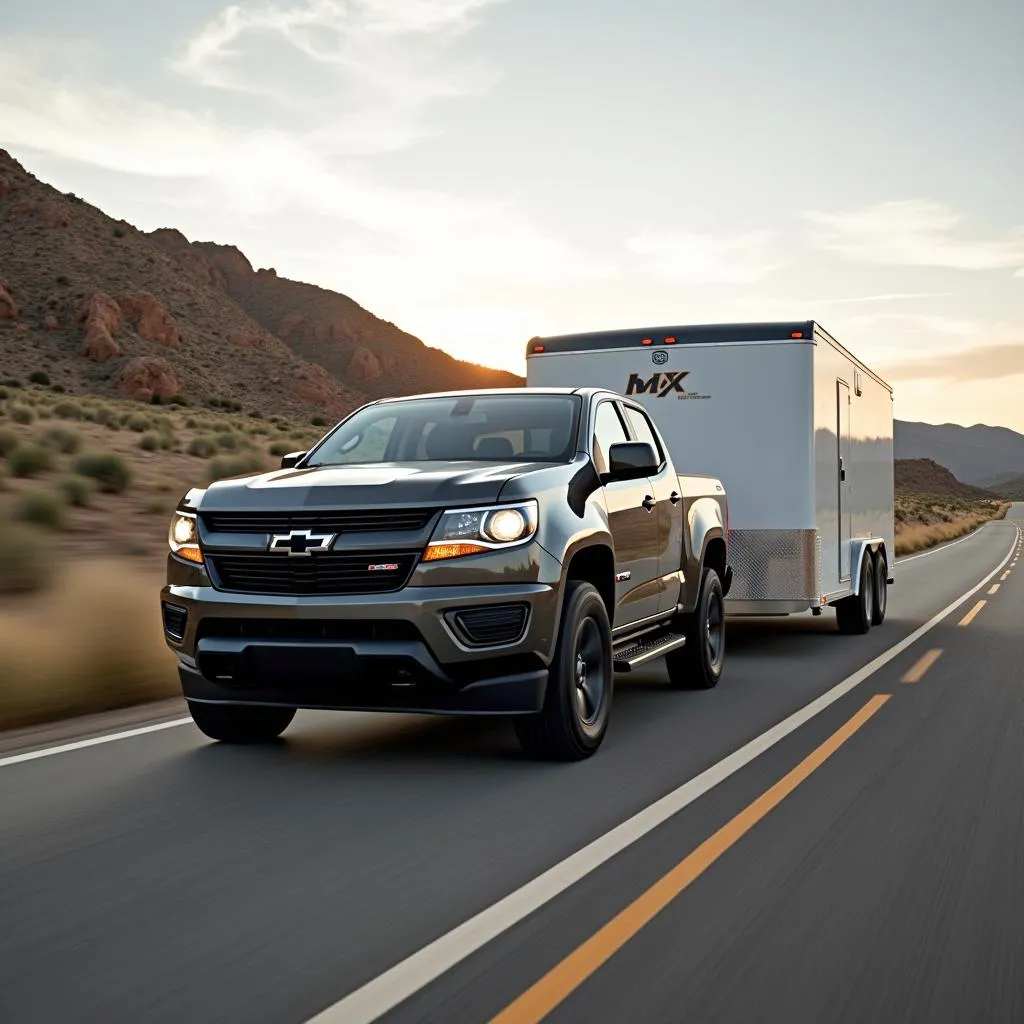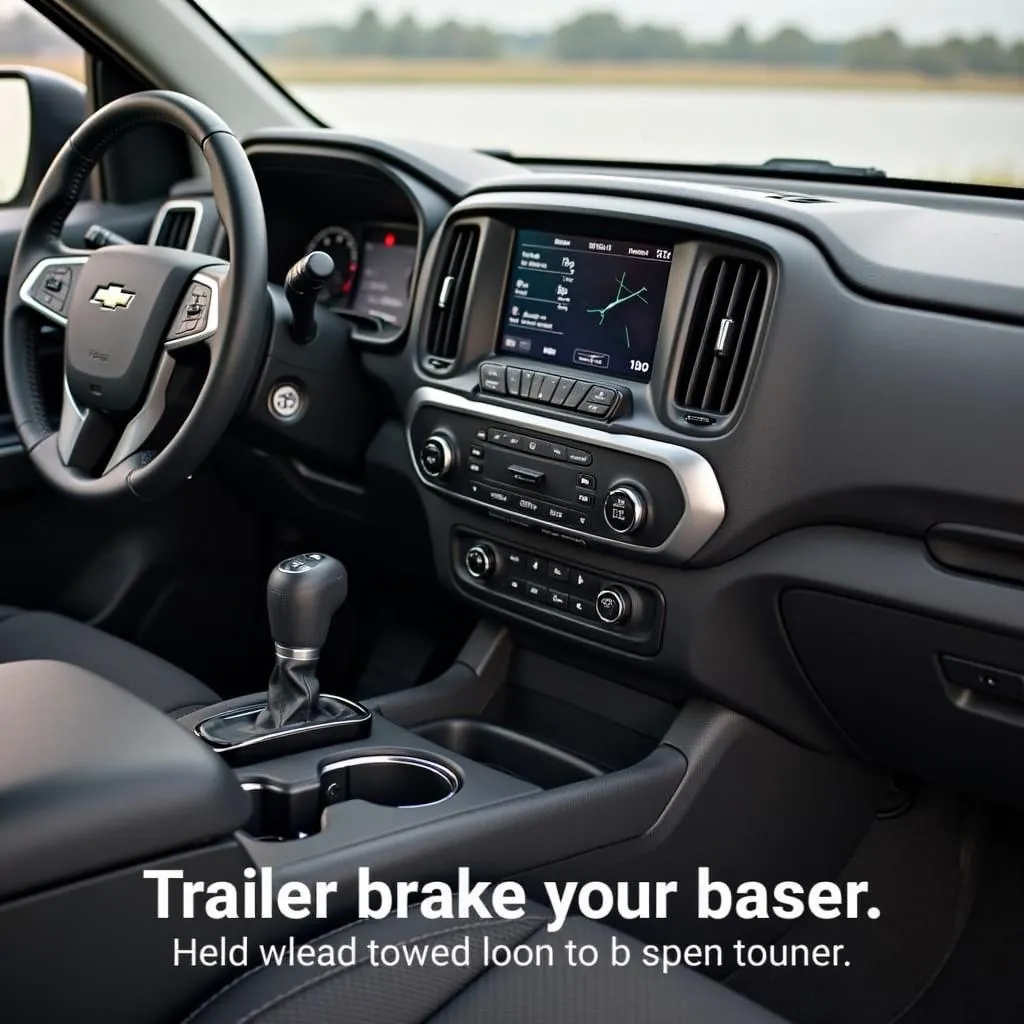The Chevrolet Colorado is a popular choice for a mid-size pickup truck, known for its versatility and capability. One common question potential buyers have is, “What is the towing capacity of a Chevy Colorado?” Understanding this factor is crucial for anyone planning to haul trailers, boats, or other heavy loads. This article delves into the towing capabilities of the Chevy Colorado, providing you with the information you need to make an informed decision.
Factors Affecting Towing Capacity
Before we dive into the specifics, it’s essential to understand that the towing capacity of a Chevy Colorado isn’t a one-size-fits-all figure. Several factors influence how much weight a particular model can safely tow:
- Engine Choice: The engine is the heart of towing power. A more potent engine, like the available diesel option, will generally offer a higher towing capacity.
- Drivetrain: Four-wheel drive (4WD) models typically have a higher towing capacity compared to their two-wheel drive (2WD) counterparts due to increased traction.
- Cab and Bed Configuration: Crew cab models, offering more passenger space, may have a slightly reduced towing capacity compared to extended or regular cab configurations due to weight distribution. Similarly, a longer bed can sometimes limit towing capacity compared to a shorter bed.
- Trim Level and Packages: Certain trim levels and packages are designed with towing in mind and may include features that enhance towing capacity, such as upgraded cooling systems or trailer brake controllers.
Chevy Colorado Towing Capacity by Year and Engine
To give you a clearer picture, let’s look at the towing capacity of the Chevy Colorado across different model years and engine options:
2023 Chevy Colorado
- 2.7L Turbocharged I4 (Standard Output): Up to 3,500 lbs
- 2.7L Turbocharged I4 (High Output): Up to 7,700 lbs
 2023 Chevy Colorado towing a trailer
2023 Chevy Colorado towing a trailer
2022 Chevy Colorado
- 2.5L I4: Up to 3,500 lbs
- 3.6L V6: Up to 7,000 lbs
- 2.8L Duramax Turbo-Diesel I4: Up to 7,700 lbs
2021 Chevy Colorado
- 2.5L I4: Up to 3,500 lbs
- 3.6L V6: Up to 7,000 lbs
- 2.8L Duramax Turbo-Diesel I4: Up to 7,700 lbs
 Chevy Colorado engine options
Chevy Colorado engine options
Note: These are general figures and can vary slightly based on the specific configuration of the vehicle. Always refer to the owner’s manual or consult a Chevrolet dealer for the exact towing capacity of your chosen Colorado model.
Understanding Payload Capacity
While towing capacity refers to the maximum weight a vehicle can pull, payload capacity is equally important. Payload refers to the combined weight of passengers and cargo that the truck can carry in its bed.
Exceeding either the towing or payload capacity can lead to safety hazards, affecting the vehicle’s handling, braking, and overall stability.
Towing Features and Technologies
Chevrolet equips the Colorado with various features designed to make towing safer and more manageable:
- Trailer Sway Control: This system helps detect and mitigate trailer sway, keeping the trailer stable, especially at higher speeds or in windy conditions.
- Hill Start Assist: This feature prevents rollback when starting on an incline while towing.
- Integrated Trailer Brake Controller: This allows for seamless and proportional braking between the truck and trailer.
 Chevy Colorado interior with trailer brake controller
Chevy Colorado interior with trailer brake controller
Is the Chevy Colorado a Good Truck for Towing?
The Chevy Colorado, especially when properly equipped, is a capable mid-size truck for towing. With its range of engine options and available towing features, it can handle a variety of towing needs, from small utility trailers to boats and campers.
FAQs:
1. Can I increase the towing capacity of my Chevy Colorado?
While aftermarket modifications are available, it’s generally not recommended to exceed the manufacturer’s specified towing capacity. Doing so can void your warranty and compromise the vehicle’s safety and reliability.
2. What type of hitch do I need for my Chevy Colorado?
The type of hitch you’ll need depends on the weight of your trailer and the towing capacity of your specific Colorado model. Consult your owner’s manual or a hitch installation specialist to determine the correct hitch class and installation requirements.
3. Do I need a weight-distributing hitch for my Chevy Colorado?
Weight-distributing hitches are recommended for heavier trailers as they help to distribute the trailer’s tongue weight more evenly across the truck’s axles, improving stability and handling.
4. What is the difference between conventional and gooseneck towing?
Conventional towing uses a ball-and-coupler hitch mounted to the truck’s frame, while gooseneck towing utilizes a hitch that sits in the truck’s bed. Gooseneck towing generally offers higher towing capacities and improved stability for heavier trailers.
5. Where can I find more information about towing with my Chevy Colorado?
Your owner’s manual is an invaluable resource for all towing-related information, including specific towing capacity charts, recommended towing practices, and safety guidelines.
Need More Information?
For any further assistance or inquiries about the towing capacity of a Chevy Colorado or to explore our range of services, please don’t hesitate to contact us.
Call us at: 0373298888
Email us at: [email protected]
Visit us at: 86 Cầu Giấy, Hà Nội.
Our dedicated customer support team is available 24/7 to assist you.

